James Polk: Recipes from the Doctor
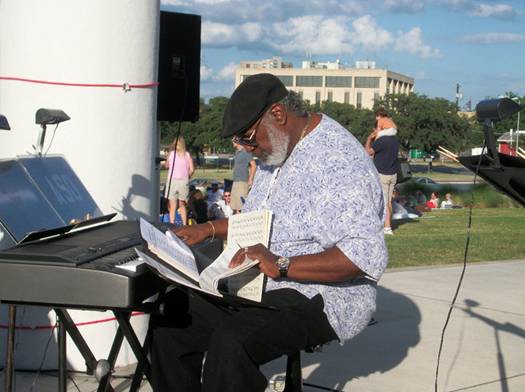
James Polk at the Long Center Concert (photo Rick Haering)
By : Josep Pedro
Pianist Dr. James Polk's musical knowledge and worldwide experience spans over more than 50 years. His style, deeply-rooted in the blues, is an example of richness and experience. Polk came up along with a group of incredible Texan musicians; jazz and blues artists like David "Fathead" Newman, Russell Jacquet, Arnett Cobb, Don Wilkerson, and Ornette Coleman, and his sound has that unique Texas flavor. An accomplished musician who has played almost every instrument, Polk was born on September 10, 1940 in Yoakum, and grew up in Corpus Christi, where he initiated his extensive resume.
In 1959, Polk moved to Austin, where he eventually formed his own band, James Polk & the Brothers, which became one of the first integrated bands in a still largely segregated town. Featuring some of the finest musicians around Austin (Martin Banks, W.C. Clark, Matthew Robinson and Angela Strehli), James Polk & the Brothers also became a "Blakey's Messengers" type music academy for playing blues, funk, and jazz.
Once invited by Lionel Hampton to tour Europe, Polk is best-known for his work with Ray Charles. From 1978 to 1985, he toured and worked as an organist, pianist, writer, arranger and conductor. He was featured on several of Charles' records, including Ain't It So (Concord, 1979), Brother Ray Is At It Again (Crossover/Atlantic, 1980), Wish You Were Here Tonight (Concord, 1983), and The Spirit of Christmas (Concord, 1985), and was nominated for two Grammy Awards.
Polk's determination, and his great work with Charles, led to touring all over the world and appearing on many television specials. Furthermore, Polk has been involved in different projects, becoming the pianist/arranger/conductor for artists including Hank Crawford, Zola Taylor and The Platters, and leading several bands such as James Polk & Company and JAMAD Sextet, where he played and recorded with fellow Austin-based musicians.
Polk's regular performances continue today in Austin, the town transformed by his music. This jazz piano master, who has certainly become a leading figure in the Austin's history and music scene, currently performs as a leader, pianist and occasional singer with his trio, and the Centerpeace jazz Band, with whom he is working on a new album.
Growing Up With Music
Black & White
Music in Austin: A Turning Wheel
Making His Way in the Market
Playing with Ray Charles
Styles, Memories and Something to Look Forward To...
“It was just a natural progression for me
to go into music. It wasn’t hard for me at all.”
When did you start playing music?
I started playing music when I was about eight or nine years old. I started playing professional music when I was about 13. So it's been a long time. About 57 years ago?
Was piano your first instrument?
Yes, I guess you could say it was piano. There was a piano always around my house when I was a kid coming up. Actually, my grandmother's piano. When she died, we moved the piano to my house. My father played piano, my mother played piano, my aunt played piano, my sister played piano... Everybody just played piano, so it was a natural progression for me to learn how to play piano.
But my first instrument in school, when I went to elementary school, was the violin. I hated it. [I] didn't like it at all. I stuck with that for a little while, and then I switched over to the saxophone. Then they wouldn't let me play the saxophone in the band--in the middle school band, when I finished elementary school--because the band director said they had too many saxophone players, so I wound up playing trombone. I played trombone all the way through middle school, high school, and college. I started playing the piano when I got out of college. No more trombone. By that time I had got interested in playing piano.
Coming from a musical family, what was the significance of music?
That everybody played. No one was actually professional except my mother. My mother was a vocalist, so she toured when she was a young child, singing gospel music. My aunt, my father's sister, played the piano in church, man, for 60 years. Everybody in my family was musical. My sister played the clarinet and drums when she was in school. She didn't play after she got out of high school. But everybody in my family played some kind of music. I had music in my family ever since I can remember. It was just a natural progression for me to go into music; it wasn't hard for me at all.
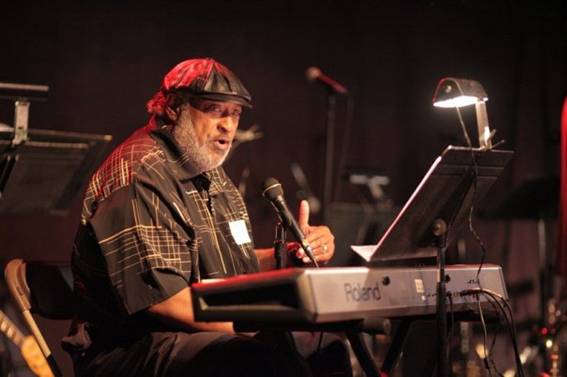
James Polk at Antone’s (photo Victor Engel)
From your own experience, but also in a general sense, how has church influenced the development of Black music?
Well, the church played a big influence on Black music, because, basically, the music that I finally started going into---which is jazz music, ultimately---it all got it start with slaves, with the slavery. It was a natural progression because the slaves would be singing gospel and sacred music in the fields as they work, and that progression into what we call the blues, which was a natural progression into jazz.
My first encounter with music was, of course, the church because my mother took me to church when I was a little boy. So I always heard gospel music which quite naturally had to influence me. Most black people were influenced by gospel music in the church because it's where they came from. If they didn't go to church, they were still influenced by that because that's where they came from.
Which music did you listen to by that time?
I grew up in Corpus Christi, Texas--which is South Texas--and the most music that was heard for everyone during that time was what they call Conjunto and Tejano, which was Mexican music. There was a lot of Mexicans in Corpus Christi at that time. The white experience was country and western, so I heard a lot of that. I heard a lot of Mexican music and a lot of country and western music.
The black experience when I was a kid coming up, they had one radio station in Corpus Christi that allowed a black disc jockey to play music late, 30 minutes, from 12 to 12.30 everyday, and on Saturday. That was the extent of it. The type of music he played was what you call rhythm & blues. It was blues, more or less. They called it rhythm & blues because it was an upbeat form of the blues. They didn't put jazz on radio during that time. I got a little bit of that coming up as a kid. Of course when I got to college it was more over it because I went to college here in Austin.
Was that rhythm and blues of the late '40s and '50s already rock 'n' roll? They had Louis Jordan, Big Joe Turner, horns, piano, and the blues form that rock 'n' roll took, too.
JP: You know, the blues form started in the Mississippi Delta, of course. Down in Mississippi. Usually it was with just a guitarist---this guy playing guitar and singing. Like James Johnson, guitarist, Charley Patton... these were some of the early guys. ... They started playing guitar and singing and they were playing the blues.
Now, the reason [why] they started calling it rhythm & blues was because Muddy Waters, who's from down there, moved to Chicago and he added the drummer and the bassist, which gave it that upbeat tempo. Before they called it rhythm and blues, they called it jump music.
Jazz as we know it today was started with the jazz revolution, which happened in the mid-forties. That's kind of the way that happened. But it all came from the blues, which is the first thing I started playing when I was about thirteen years old. I started playing with a blues band. That was a good experience.
There are a lot of great Texan jazz artists like Charlie Christian, Ornette Coleman, Kenny Dorham, and Illinois Jacquet, that are often not thought as Texan because they moved up north to follow their careers. Why did they have to go?
Because down in this part of the United States, which is the Southern part of the United States, and due to the history the Southern United States had against black people. Back in the forties and fifties and all the way up onto the sixties they were still lynching black people. They were killing black people and lynching them. Musicians didn't want to expose themselves to all of that trouble so they didn't tour this part of the country. Plus, the money wasn't that great. For instance, Kenny Dorham was from Austin, Texas. He was from right here and a personal friend of mine. I knew him.

Ornette Coleman and Dr. James Polk
Ornette Coleman is from Forth Worth, Texas. I had the chance to live with him about three months in New York, so he's a friend of mine. I knew Illinois Jacquet, and I used to play with his brother [Russell Jacquet] quite a lot in Los Angeles. I knew Arnett Cobb, who was also from Houston, Texas and one of the Texas Tenors. I knew Don Wilkerson. As a matter of fact, I was on the road with Ray Charles for ten years, and [Don Wilkerson] was on the road with me. And James Clay, who's from Dallas, Texas is another good friend of mine. I knew a lot of these guys because, like I said, I came up during the fifties and the sixties, and these guys did too.
I started college in the late fifties, so the only way that we had to learn jazz music was through records. Through listening to what the other artist in New York were doing, because there weren't any places here that would bring those artists down in this area. Maybe to Dallas, every now and then, maybe to Houston every now and then... The difference being, growing up listening to that kind of music in New York, Philadelphia, New Jersey, Kansas City, up in that part of the country, they had those venues were those guys played. You know, they had the clubs and things were those guys played and you could go sit and listen to them. You couldn't do that here.
Those guys didn't tour this part of the country because of money wasn't there, it was too expensive for them to come here, plus the accommodations... They couldn't stay at hotels. There were no hotels, because there probably weren't too many black-owned hotels in this part of the country. They were a few, and those that were here did accommodate some of these black jazz musicians when they did finally come here, but musicians, black musicians, couldn't stay in the hotels. They couldn't eat in the restaurants. The only clubs that they could play were the black clubs. They couldn't play in the top venues.
The only place where they could do that was in New York, and they had problems there, too. They could play in the Cotton Club, which was owned by white people. [In] the Savoy Room and places like that. But it was more of those places in New York, and New Jersey, and Kansas City, and places like that than there were down here. So, there was no attraction for those black musicians to come to this part of the country. The only way we would learn would be getting the records that they made and sit and listen to them and try to figure out. "What is he doing here? What is he doing there?"
There was an area in Dallas called Deep Ellum.
Yeah, and also South Dallas. I didn't know too much about Deep Ellum, but most of the music that came out of Dallas was South Dallas during that period of time, during the fifties and the sixties. I was going to college here [Austin] in the late fifties and early sixties, and I would drive up to Dallas on the weekend just to go to jam sessions. Of course, they had some in Houston too. I knew I was going have a good time and I was gonna hear some good music coming from those guys.
“Everything that was coming into this side of town just dried out and stopped because black people could go to other places and white people weren’t coming over here. They didn’t have to.”
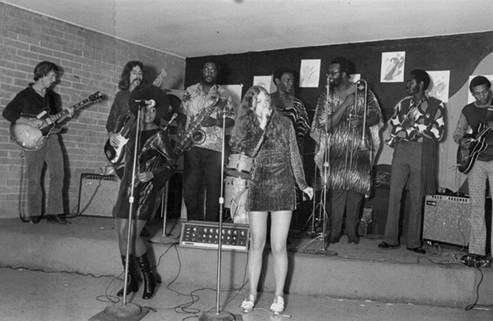
James Polk & the Brothers
Did you have the first integrated bands in Austin?
Probably not the first, but I did have one of the earlier ones. After I got out of college, I started teaching. I was a high school band director in Elgin, Texas, which is a few miles down the road. That's when James Brown was really popular, that style of music. I had some guys, and I've always liked to put my best foot forward when it comes to music. I didn't like to spend a lot of time learning by rote. What we mean by rote is putting on a record and try to learn what these guys did. "What is he playing there? What note did he play here? Why did he do that?" That takes a long time, in order to learn that way. So what I did, I wrote the music. I did the listening and I figured out what they were playing. I wrote the music for the guys to play, and there weren't too many black musicians that could read the music. I had a few, but there weren't too many. So my option was to find somebody that could read the music.
I ran into some guys who had finished UT [University of Texas], and could do just that. It just happened that they were white. So I said, "Well, so?" I'm looking for the best quality. I found out that if I did that, then I could get my band into a whole lot of clubs that were not hiring just black bands. There were a lot of clubs hiring black bands, but chances are that they would hire my band quicker because I had black and white personnel. I had a young lady by the name of Angela Strehli, who's a pretty big name in rock 'n' roll. I gave her, her first gig. She used to be an English teacher, and she decided that she wanted to sing some blues. She loved the blues, so I said: "Hey, why not? Let's try." A guy by the name of John Reed was the guitarist. He was playing with a country band but he always wanted to play some blues, so I said: "Well, OK. Come on man, let's try!" And I had a guy by the name of Don Luppo, a white guy that played bass.
The rest were some guys around here, in this area. Larry Townsend played trombone. Martin Banks, who had lived in New York City but had moved back to Texas, he played trumpet. I had a guy by the name of Don Shoaf, known as Donny Boy, and then I had a guy by the name Aaron Littlefield Jr. that played drums. And Matthew Robinson, who's a big name now. WC Clark played in my band. We had a lot of fun, man. We did a lot of travelling. I bought a big old school bus and we use to travel around in a school bus. We had a lot of fun. I painted it green and white. All the school buses were yellow and I didn't want ride around in a yellow school bus so I painted it green and white. We travelled around. We hired a driver, so we wouldn't have to drive. That was a lot of fun, man.
WC Clark told me that he played in your band. Was he playing bass?
Yeah, he also played guitar. He was good, man. Then I left and moved to California, and when I came back he was a big name. He did good, and he's still doing great. He's a great guy, man. Nice fella.
After the interest of white college students in East Austin, how did integration affect the East Austin music scene?
Here in Austin, the only affect came in the black area of town. It didn't affect the white portion of town that much. Some of the larger venues closed, simply because the owners probably died out and stuff like that. They passed on, and those places closed down. One was called the Jade Room. It was owned by a guy by the name of Dr. Funk---that was his name. Margorie Funk, that was his wife. And there was a place called the New Orleans Club, which used to be on Red River and 12th Street, I think.
Of course, there were a lot of venues on this side of IH-35, Charlie's Playhouse being one. Well, during those days the students from UT would come over to Charlie's Playhouse. Charlie owned another club way further east, which was called the Chicken Shack. It was an after hour place that opened up like at one or two o'clock in the morning and stayed open till like six o'clock. A lot of white students from UT would come over to this side of town to hear rhythm and blues, rock 'n' roll---if that's what you wanted to hear--because they knew they could get a better rendition of it over here.
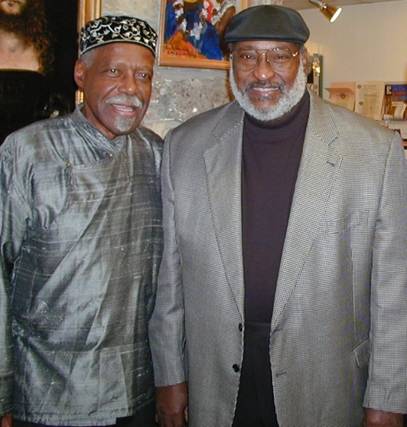
David “Fathead” Newman and James Polk
What happened, in the course of integration, and school desegregation, they finally decided to integrate the schools here in Austin. They integrated schools in 1971, I think. Or about then. It happened in most of your major cities; they went in and closed the black high school. They closed it. So when the closed the black high school, they started integrating the other schools and busing black students to other high schools. There was a guy who owned a restaurant on the corner of I think it was 10th and Congress, I forget his name, but it was called the Piccadilly Restaurant. This guy was before Lester Maddox, who was down somewhere in Georgia, Mississippi. He stood up in front of the restaurant, with a baseball bat, and said that he wouldn't let anybody black come in the restaurant. That happened right here in Austin, at Piccadilly Restaurant. The guy stood out there with a baseball bat. Well, he was the last one to hold out, but some of your restaurants started allowing black people to come in, and so black people were given the chance to go to some of those clubs that they were denied many years before.
Black people started going to those clubs. They started going to clubs on the West side of town, the north side, the south side of town that they couldn't go before. So what happened to the east side? It dried out. A lot of the little clubs started closing. They closed the high school down there, so what happened to the east side of town? Everything that was coming into this side of town just dried out and stopped, because black people could go to other places and white people weren't coming over here. They didn't have to. They didn't have to come over to these little clubs. They had their own. That's basically what happened here in Austin, Texas and you can see the fruits of that today. Most of the black clubs are going down. There are hardly any black clubs in East Austin right now. And now the white people are buying up property in East Austin right and left, man, as we speak.
Even where I live, right now, this house we're sitting in, this used to be Fred Acres' house, the guy who was coach to UT. This is the house he owned; of course, I own it now. But this part of town when I was coming up in the sixties and early seventies... black people couldn't live over here. Finally, all of that opened up and now black people are more or less able to live wherever they choose. This was in the late sixties and the seventies. That's what kind of happened to Austin, as far as the Black music is concerned. Clubs started closing up. A few opened up again but most of them are gone till this day. They're gone, no more.
“I didn’t go to school to study to be a doctor. I learnt everything I learnt out in the street which is probably more than what I would have to learn at school.”
What are the main changes you have seen in the music scene since you started?
The music scene has changed somewhat. 6th Street, back in the late forties and early fifties, used to be totally black. All those were black clubs and I saw that change. I saw that go down completely and it was revived again under, I think, Carol Keaton who was the mayor of Austin then. She decided that she wanted to revitalize 6th Street and make 6th Street like Bourbon Street in the French Quarter [of New Orleans]. And with that came a lot of clubs right there on 6th Street. Of course, when it first started there were two or three jazz clubs down there. That changed because they weren't patronizing the jazz clubs as much as they were the other ones.
What I have seen a lot change is the music scene in Austin with the beginning of 6th Street. A lot of musicians came here. A lot of rock 'n' roll and blues bands came to 6th Street. Now is the Warehouse District, down on Colorado, that particular area. Back in the early and late seventies, 15th and Lavaca. There's two hotels over there now, but that was more or less the area of interest. There were a lot of clubs right there in that little area. Blue Parrot, Casablanca, Castle Creek... those were some of the names of the clubs. Rick's, Italian Spaghetti House... And on Lavaca, there was a big record store. Record Warehouse, I believe it was called. That was more the area of interest and of course the Drag had a lot of clubs back in the sixties and seventies. There was what you call the Beatnik Era.
During the beatnik daysm there were a lot of clubs on the Drag, on Guadalupe, because we played in a lot of clubs over there. I saw all of that change. Now the areas of interest, of course, will be 6th Street and the Warehouse District, and, of course, some of the outer areas. During that time what we call the strip malls, there weren't any. There was no Lincoln Village, there was no Anderson Mall, there was no Barton Creek Mall, there was nothing like that. The first mall that came to Austin was Capital Plaza, right over there in IH-35. They didn't have any clubs in there but a lot of these other places started opening up, and you started getting these clubs.
Austin has always been a high cultural city, because of the number of colleges and universities here. Of course, with Huston Tillotson College, where I graduated--now Huston Tillotson University. Before that, the Black institutions were Sam Houston College and Tillotson College. They merged in 1952 and became Huston Tillotson University. You have Huston Tillotson, Concordia which moved off IH-35, you have Saint Edwards, you have the University of Texas and you have the ACC, Austin Community College which started in the seventies, I believe it was. So you have a large influx of students, of young people that would frequent those places. You know, your clubs, your music scene because on the weekends that's what they live for. Students live to go out, and drink beer and get drunk, fall down and have a good time. Which I guess is all part of growing up because I did it too. We all did the same thing.
So that's what I have seen changed. It was more localized when I was a youngster because there were a few clubs in the Black side of town, but that was as far as we could go being a black kid and a black student coming up here in Austin. I couldn't go to those other places because there weren't so many anyway. Only in the seventies, we saw that changed. I was working for IBM during those days, and I saw all of that change to where it is now.
People don't go to the Drag very much anymore...
No. That used to be real popular, man. Like I said, back in the beatnik days, what we call the Beat generation, the Drag was very popular. There were a lot of clubs on the Drag. I saw, in the papers, they wanted to close that Cactus Club. That used to be a real popular club on the campus. They used to have a lot during the beat generation, when clubs didn't have tables or chairs. They just had these big throw pillows on the floor. People would come, sit on the floor and listen to jazz music, and it gave that ambiance of being more in touch with the people. It was a lot of fun. Those were some good days.
There's nothing like that nowadays. People would listen to jazz music more than they do today. Now people go out to these clubs and laugh and talk, get drunk and don't pay any attention to what the music is going on. Very seldom. I know the Elephant Room is a prime example. I've worked there a lot with my newly formed band called Centerpeace. We just played there this past Saturday night and people there keep more noise than the band. But that's the way it is.
Do you feel that music appreciation is different in overseas than it is in the States?
Yes, absolutely. Music is incidental here. People, even club owners, don't really care that much. They're more concerned about how much that cash register is bringing up, how many drinks they're selling, you know. They wanna get the musicians in to play in these clubs and don't pay them anything. That's what happened a lot here in Austin. You have young musicians who come to this town and are not really concerned about being able to make a fair wage and live of what they are doing because they probably got their parents supporting them at school and stuff like that. So they don't really care about how much money they are making; it's just the fun of being able to play.
Well, that messes over the guy who's looking to make this a livelihood. You can't live off of a hundred dollars a week, man. You can't do that. Two hundred dollars a week, three hundred dollars a week... you can't. And there's a lot of people that exist over that because a lot of these young musicians are all pooling together, living in the same place. And they eat fritos and drink beer... [Laughs] You can't do that. I can't do that! I can't live like this, man. [Laughs]
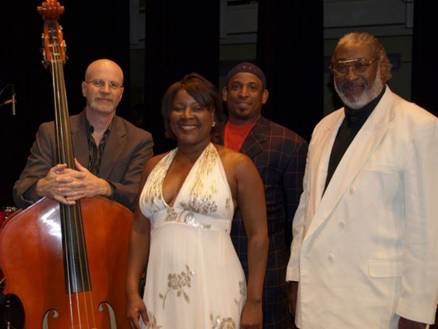
Ed Friedland, Pamela Hart, Kevin Scott and James Polk
What do you think about Austin being named the Live Music Capital of The World?
Every city has to have some kind of motto, some kind of handle that you would recognize the city for. Something, let us say, well we are owned by this. I've heard Austin called the river city because of the Colorado River going through. That's how they call San Antonio, the river city. That's good for Austin. Now, I've been all over the world playing music and I can say this for a fact that Austin does have more live venues than a lot of other major places per capita. Like if you would even talk about New York, it probably has more clubs that musicians can play live in than New York. I know they do more than Los Angeles, per capita, because I lived in Los Angeles for ten years, and I know that Austin does have a lot of live music.
It's good to be known as the live music capital of the world because it attracted a lot of musicians here, for that simple reason. They say, "Hey there's a lot of music happening in Austin, Texas," which it is. There are a lot of clubs here now which attract and they have live music. I'm glad that they consider this the live music capital of the world because it gives a spotlight on music. It focuses on music, no matter what kind of music you're playing its still music, which is good for musicians and it's good for the economy.
South by South West, you know how that guy started. The guy started South by South West because he wanted to give the club owners the chance to make some money over the weekend. Very few musicians get paid for coming here for South By South West, and they get probably over a thousand bands that come here. So he started that idea which was a good idea, it wasn't bad, but the only thing I think is they're using the musicians. Musicians pay their own way here from Spain, from the Netherlands, from Japan. They pay their own way; nobody's paying for them to come. So they pay their own way just to come here and play in some of these clubs with the thought of maybe securing a record contract. So far, as I know, there hasn't been too many--maybe there's been some--but there hasn't been many record contracts gotten from South By South West. But it does the economy good. They pump over two or three million dollars within that week, or whatever it is, which is good for the city of Austin. I can't really say anything bad about it but I don't really participate in it unless they're gonna pay me. If somebody pays me, I'll play. But I'm not playing for nothing, I'm too old. I probably would have done that when I was twenty years old. Long time ago...
“I started Twink Records because I wasn’t getting any label.”
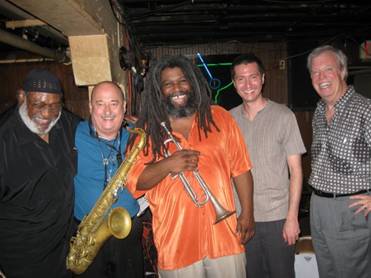
James Polk, , Jeff Loton, Jones, and Butch Miles at the Elephant Room (photo Jeff Lofton)
When did you start Twink Records?
1969, I believe is when I first started. There was a guy here by the name of Bill Josie, who had Sonar Beat Records. He recorded a couple of my songs and he was going to put out a 45, but he died before it got out. His son took over the record company and didn't do much with it. As a matter of fact, I got an email from him a couple of years ago. He's out in San Francisco. They never did much with that 45, but some guy sent me a copy of that from Europe; he found a copy. I don't know how these guys find these things man, but they did. That's kind of the reason why I started Twink Records, because I wasn't getting any label.
There were no major labels down. There was only one big record company down in this part of the country which was Duke-Peacock Records, down in Houston. They were blues, they didn't do any jazz. I knew I didn't stand a snowball chance in the eighties for getting in that record label. I said, "Maybe I should start my own." So I did. Of course, it takes a lot of money breaking for an independent label because this was pre-Internet and pre-everything. You had to have a lot of money to be able to get it. Distribution is still the hardest thing to do. Even now it's still hard, even with the Internet. You got companies set up now that all they do is distribute but is hard to get them. I've got all my CDs listed with Amazon.com and CDBaby and places like that, but, still, if you're not a well-known artist and they're not spinning your CDs on radio or across the country, people just don't know who you are. So chances are you don't get it sold that much.
I noticed your two CDs, When the Evening Comes (Twink, 2001) and Go with The Flow (Twink, 2007) both have a different sound.
Yeah. Well, [in When the Evening Comes] I went for more, what they call Smooth jazz. They named it Smooth jazz. I kind of went for that more than traditional straight-ahead jazz simply because it was selling more. And of course, I like the music. I like all forms of music. It comes easy for me to write, it comes easy to play so I decided to put that out. I like it all. Of course, straight-ahead jazz is probably my first love, but I do it all, and I decided to do something like that. No major label has picked me up even to this day so I decided years ago that I would start my own record label, which I did.
Right know we got out about four different CDs on my record label. Years ago, back in the sixties, there were 45 RPMs. A guy called me the other day, well he sent me an email from Germany and they got one of my 45 RPMS over there. I've had guys come over here from Japan. I've had guys come here, right at this same table, from England wanting those 45s. And they're selling big in Europe, but I don't get a dime for them. That's awful, but I called BMI and they said there's nothing that they can do. That's what they told me. A guy just emailed me a couple of weeks ago, and he's doing a compilation CD, and he wanted one of my songs so I said fine. Let's see how that works.
I've noticed that musicians in Austin work a lot on a live basis, but it's not so much about recording.
No it's not and that's a shame. It really is, man. It's big money behind putting out CDs, because [if] you think about the amount of money a musician makes for playing a gig, it's nothing like it would be for doing recording CDs. Just to record a thousand CDs it'll cost you a thousand dollars. But those major record labels, when they print, they print fifty thousand, sixty thousand, one hundred thousand at a time, so the small independent label doesn't have the cash flow to be able to do that. That's the hardest part about it. What the independent labels try to do is, if you print up five thousand copies, and you can sell a whole lot of them of the bandstand and places like that, you can recoup some of your money back. But then you gotta get them into the records stores.
There's still a lot of records stores around. It's hard. What you do is put them on those record stores on consignment and they usually don't take more than ten copies at the most. If you sell your CDs for fifteen bucks they are only going to give you maybe ten dollars, if they give you that much. They're gonna sell it for fifteen so they're making five dollars off your record. And most of them won't take them for that because you are unknown, so they're not gonna sell your CDs for 15 bucks. They might put them up and they say, "Well, OK, we'll give you ten dollars apiece for these CDs." Then they sell them for seventeen or eighteen dollars. They tell you they're gonna sell it for ten, which you only get maybe six dollars of that and then they're selling them for seventeen or eighteen bucks. So the money is going to the record store, not to the artist. It's really a tough area to get into. It's really a tough area. Of course, I haven't been doing as much with it lately as I have done in the past but I hope to someday get it going again.
“The only thing Ray Charles couldn’t do was see.
He could do everything else, everything.”
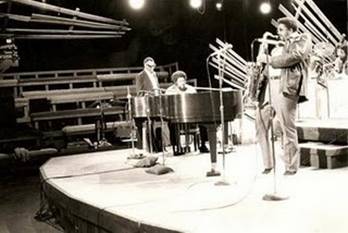
James Polk with Ray Charles
What did you learn during the time you worked with Ray Charles?
I learned quite a bit from Ray Charles, because I worked with him on a one-to-one basis a lot. It was just he and I, many times, in the studio. He did all the engineering himself ever since, I guess, the seventies on. He did everything. I learned a lot about engineering from him, and a lot about orchestrating and writing music for bands, because he was a great arranger, a great orchestrator, and a great creator of music. It was just a great learning experience for me. He was a hard worker, man. And I learned a lot about blind people too. The only thing Ray Charles couldn't do was see. He could do everything else, everything. I even tried to trick him one time. The control room, where he worked a lot on the board, had carpet on it and one day I was tiptoeing in easy so that he couldn't hear me, and he stopped what he was doing and said, "Come on in, James." I said, "How did you know I was here, man?" He said, "I heard your heartbeat." Great ears, man. It was a wonderful experience. I learned a lot, a lot.
Did you both play piano?
I played piano before he would come out. See, he travelled with a 36-piece group: five female singers and 17-piece, 18-piece orchestra. I played piano with the orchestra before he would come out and start singing. When he would come out and start singing I would go on to the other side of the stage and played the organ. That's how it worked out. It was great.
Another Texan who was famous for playing with Ray Charles was David "Fathead" Newman.
Good friend of mine. As a matter of fact, I did a concert with him... was last November, I believe it was, he came here. They have an Episcopal church, St James Episcopal Church, and they bring people every November for a few days and I played with David. He told me then that he had cancer and he passed soon after he went back to New York. But I have known David for many, many, many years.
“We had group listening sessions where 5 or 6 of us would get together and put a record on.”
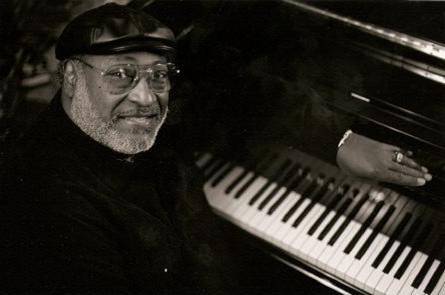
James Polk
One of the things you're well known for is your knowledge of music. You've always tried to teach the musicians around you and, of course, you've been a university professor. Does the teaching go together with the playing?
Well, when I finished college with a bachelor's degree in music, I started teaching high school band. I was the high school band director. I just kind of progressed from that point on and I ended up finishing my career by teaching at Texas State University in San Marcos. I was the associate director of jazz Studies program down there where I taught jazz history, and a lot of the jazz courses. Of course, it's always been a learning process for me, as well as the students. Whatever I learned, I tried to expose that to my students. I tried to give it back to my students. I tried to find the easiest route to learning what jazz music is about, learning what creativity is about. We're all born with some kind of creative instinct. Everybody.
A lot of people go through life and never realize what it is but those who are fortunate in music and learn what that creativity thing within them is have a chance to pull it out, and it was my job to try and recognize that in that person and try to pull it out of them. You know, "you can do this." I've always tried to maintain a real positive attitude because I love jazz music. Jazz music is my first love. Ray Charles used to teach me, there are only two kinds of music: good and bad. What makes it good is that if you do it right. If you do it wrong is bad. It's simple, you know.
My motto when I taught at school was KISS which means Keep It Simple, Stupid. [Laughs] The other one was "Don't Forsake the Groove." You've gotta always make the music groove. Make it groove and make somebody else feel good by listening to your music. The way to do that, you play the music correct, put yourself into it, make sure that it's technically right... It's either gonna be right or it's gonna be wrong. And why do it wrong the first time? If you do it right the first time you won't have to go back and do it again. I have some simple rules. I use to tell my students "If you can say the first seven letters of the alphabet you can be a musician. A, B, C, D, E, F, G" and then you start all over again. [Laughs] That's great, man.
Where does the name "Doctor" come from?
I have an honorary doctorate degree of music. Huston Tillotson offered to give me a doctorate degree of music, which is Doctor of Music. I didn't go to school to study to be a doctor. I learned everything I learned out in the street, which is probably more than what I would have to learn in school. Oh yes, and a lot of people have trouble with that. I'm not a classically-trained musician. I never taught classical music because that wasn't my thing. But there are very few people around [that] know any more about jazz music than I do. I put myself up against anybody at any university as for as knowing anything about jazz music. That's simply because I've been doing it for so long and I've learned a lot about it.
Huston Tillotson recognized that talent in me and decided to say, "Hey, this guy deserves this," so they gave me a doctor degree which gives me the same privileges as anybody who went to school. And it says that on my degree. They paid me for down in Texas State so they increased my salary because I had a doctor degree. That's where that came from, the doctor degree. That it is simply because I have learned a lot about that particular form of music.
Some decades have been associated with different styles of jazz. The thirties had swing, the forties had bebop, then came cool and hard bop... What do we have now?
Confusion! [Laughs]. Well, I see what you're talking about. As jazz music is concerned, the guys are kind of reaching back getting some of the things that were more popular, more of the traditional jazz. Of course you still got traditional jazz. You don't have free jazz, as much; Ornette Coleman was the main exponent of free jazz. So, what I see now is smooth jazz---a combination of traditional jazz, R&B and funk. They mix that together. And even some of these jazz musicians are mixing hip-hop with that jazz. Hip hop is not new, man. People don't know that they were doing hip-hop back in the 1800s. You know, what they call rap music. I can give people some classical records where these guys were doing rap, back in the 1800s. It surprised me, when I heard it, but that's what it was. Nothing's new.
Everything is rehashed over again. So the only direction of jazz is not much new coming by way of jazz. What they are doing is polytonal. What I mean by polytonal is polychords; two chords simultaneously played together. The harmonies they are resorting back more to triadic harmonies, more sequential patterns. They're playing patterns over certain stuff that they learn but that's not new either. That's just finding a different way to implement it and to improvisation. Jazz is all based around improvisation. Improvisation means to create, to make up on the spot. You have different avenues that they use now that they didn't use back in the forties in traditional jazz, because the fact of the polytonal or the chordal aspect of it. They use triads and build sequential patterns out of that. That's the direction I see it is in now, that kind of thing.
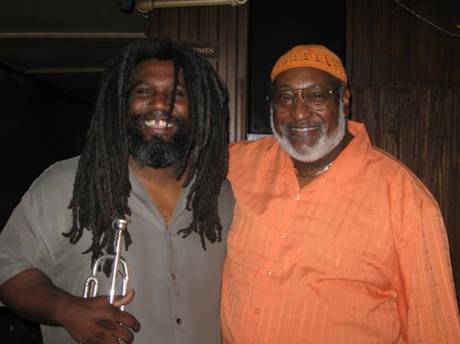
Jeff Lofton and James Polk, a fantastic couple
What music are you listening to right now?
I listen to everything, man. Well, I like traditional jazz music, I like smooth jazz, I like that combination of jazz and funk, what we call funk music... I'm not so crazy about rap or hip-hop, because what they are doing is good, in the sense that the words and the rhythms they use and are creating over... that's real unique; how they can squeeze those words into different rhythm patterns. Rap music is more rhythmical than it is anything. A lot of times, they put music that has been recorded already in the background. They're using those beat box machines, drum machines and things to create rhythms and then put words and stuff over the top. That's fine; I even listen to that. Some, but not as much as I do my traditional jazz. I like traditional jazz, I like funk, I like R&B, I like blues and, of course, I like smooth jazz.
Do you have any lifetime favorite artist or record?
I like Kind of Blue (Columbia, 1959), that was Miles Davis. I mean, I think that is one of everybody's favorite. It was an album that came out then that kind of announced the time for what the music was about. The creativity that went into making that was just great. And how they were playing back there then, you know. People are still listening to that.
That's when I was really interested in trying to really get my teeth into jazz music and listen to it. We would really listen them a lot to try and figure out what the guys were doing. See, there weren't any places here in Austin, Texas, where we could go sit down and hear these really great artists play music so the only way we could learn was by listening to those vinyl records. We had group listening sessions, where five or six of us would get together and put a record on and [Kind of Blue] was one of the records we put on. "What did he do there, man? What chord did he play? What did he play over there?" That was how we learned. We went to the piano and try to figure out: "Oh that's what he did." That was very interesting, and was one of my favorite.
A lot of albums and things and music that came along during that time were very special to me. I listened to a lot of stuff. But there wasn't too much smooth jazz during that time, no. There was a lot of blues. I listened to a lot of blues. There was a guy named King Curtis --tenor saxophone. Oh man, he's one of my favorites, too. I love King Curtis. And organ players; I listened a lot to Jimmy Smith. Jimmy was a personal friend of mine. I listened to Jimmy, and I listened toDr. Lonnie Smith and Don Patterson, organ player out of Philadelphia. Oh man, he was fantastic. I played a lot of organ. I thought I was an organist. [Laughs]
I never get the chance to meet him [King Curtis]. He got killed trying to stop a fight. And they stabbed him. That's how he died. In Dallas! That's where he lived. He was coming to his apartment and these people were out the having a fight. He tried to stop the fight and they stabbed him, killed him. Awful, man.
I believe you're working on a new record right now.
Oh yeah. Well, I'm getting the material together. The group that you heard, Centerpeace, we're gonna go in the studio and do some recordings. I haven't picked the date yet, when we're gonna do that. I got most of the music already put together. It's just trying to get the funds together. I got the studio, too, where I'm gonna go, but I'm trying to get the funds together to do that. That's on the horizon in the near future. So keep your ears open.
Interview originally published at All About Jazz

James Polk
Name: James Polk
Date of Birth: September 9, 1940
Location of Birth: Yoakum, Texas
Profession: Composer, songwriter, bandleader, music teacher, touring artist
Instrument: Keyboards, reeds, bass, drums
Vocalist: Yes
Bands: Ray Charles Orchestra, James Polk and the Brothers, JAMAD (with Martin Banks)
Collaborators: Ray Charles, George Rains, Bobby Bradford, Long John Hunter, Martin Banks
Discography: Miss Lavelle (1994); Swinging From the Rafters (1997); Live at the Elephant Room (Year not Known)
Education: BA Music--Huston-Tillotson College, Austin, Texas; MFA Music--Southwest Texas State University, San Marcos, Texas
Influences: Influenced Angela Strehli
Styles: Jazz, Blues, R&B
Venues: Antone's, Austin Music Hall, Victory Grill, Flamingo Club
Polk was one of the key figures in the Austin music scene from the late 1950s through the 1970s. Known in players' circles for his knowledge of the technical aspects of music (theory, composition, etc.), Polk was also responsible for forming the first integrated bands in the scene, which included young white players from University of Texas at Austin and Austin's West Side.
In the 1970s, Polk relocated to the West Coast to take a job with the Ray Charles Orchestra. After touring and recording internationally, he came back to Austin in the late 80s. Polk, who is very concerned with preserving Black music, has definite ideas about how to revitalize Black youth culture and would like to open an academy for the performing arts. He is now completing studies at Southwest Texas State University for his Masters of Fine Arts in music so that he will be able to teach.


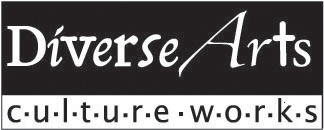
Social Media